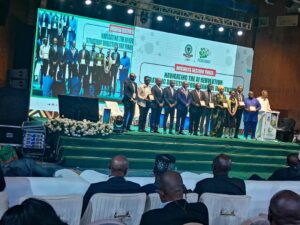By: Goodluck E. Adubazi, Abuja.
In a bold call to action, Mr. Olusegun Alebiosu, Managing Director of First Bank of Nigeria Ltd., emphasized that navigating global economic shocks should no longer be viewed merely as a matter of survival but as an opportunity to build lasting institutional resilience.
Speaking at Business Session Two of the 18th Annual Banking and Finance Conference hosted by the Chartered Institute of Bankers of Nigeria (CIBN), Alebiosu urged stakeholders to embrace adaptable risk frameworks that account for both opportunities and threats posed by global disruptions.
With the theme, “The New Economic Playbook: The Intersection of Banking, Policy, and Technology,” the conference was held from September 9–10, 2025, at the Congress Hall, Transcorp Hilton, Abuja.

Business Session Two – Key Insight
“Global shocks rarely come with global solutions,” noted Dr. Agnes Olatokunbo Martins, Chair of the Board at Guaranty Trust Bank Ltd., reinforcing the need for tailored responses grounded in local context.
The high-level session featured notable voices including Mrs. Rukaiya Bashir El-Rufai, Special Adviser to the President on NEC and Climate Change; Dr. Blaise Ijebor, Director of Risk Management, Central Bank of Nigeria; and session chairman, Mr. Bayo Olugbemi.
Session Two Resolutions: Strength Through Strategy
Risk management must be agile, flexible, and responsive to a dynamic global environment.
Institutions should factor climate and energy-related shocks into risk scenarios.
Consumer credit is vital to tackling poverty and inequality; banks should partner with Microfinance Banks (MFBs) to broaden access.
Compliance should be a structural pillar, not just a mechanism to avoid sanctions.
AI as the New Playmaker: Banks Urged to Put Technology at the Core of Strategy
Business Session Three shifted the focus to the future, themed: “Navigating the AI Revolution: Strategic Direction for Financial Institutions.”
Experts called for a phased roadmap for AI integration, emphasizing ethics, compliance, and governance, while urging banks to move from mere automation to strategic transformation.
Key recommendations included:
Make AI central to institutional strategy for long-term resilience and efficiency.
Deploy AI for internal process optimization, customer service modernization, and smarter decision-making.
Use frameworks such as “Visualize, Revolutionize, Customize, and Realize” to accelerate adoption.
Strengthen partnerships with tech firms, regulators, and stakeholders to drive innovation responsibly.
Voices from the Business Sessions
“Globalization and fragmentation pose unprecedented risks to the banking system,” warned Dr. Ahmed O. Martins.
“Rules are meant to strengthen, not stifle, institutions,” he added.
“If you don’t have ethics, everything falls to pieces,” cautioned Adepoku.
“AI is not replacing people, it’s replacing outdated skills,” noted Mr. Ijebor.
“We are moving from ‘wow’ to ‘how’—from amazement to execution,” said Dr. Shuaibu.
“AI will turn the mundane worker into a miracle worker,” he concluded.
As Nigeria’s financial landscape evolves, the conference underscored one key truth: agility, ethics, and innovation will define the next chapter of banking.